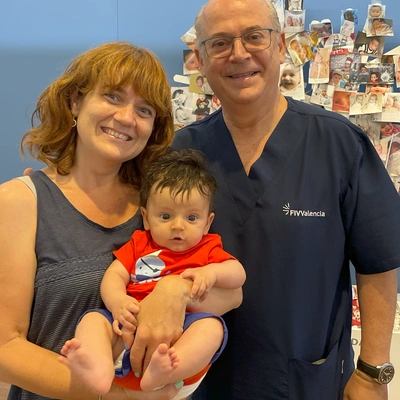Embryo Implantation Support
FIV Valencia: 100% Focused on you
- EmbryoGlue
- How Does EmbryoGlue Help with Embryo Implantation?
- Why Consider Using EmbryoGlue?
- How is EmbryoGlue Used?
- Benefits of Using EmbryoGlue
- Assisted Hatching
- How Does Assisted Hatching Work?
- When is Assisted Hatching Recommended?
- Benefits of Assisted Hatching in IVF Treatment
- Understanding the Costs of Special Laboratory Techniques
- Embryo Implantation Support FAQs
How Does EmbryoGlue Help with Embryo Implantation?

- Hyaluronan's Role: Hyaluronan is a substance naturally found in the body and is crucial in the process of embryo implantation. In EmbryoGlue, it interacts with the embryo and the uterus, helping the embryo attach to the uterine lining more effectively.
- Mimicking the Natural Environment: EmbryoGlue creates an environment similar to what the embryo would naturally encounter in the uterus. This supportive setting facilitates embryo implantation and the beginning of its development.
Why Consider Using EmbryoGlue?
Improved Pregnancy Rates
Extra Implantation Support
How is EmbryoGlue Used?
Once the embryo is in your uterus, EmbryoGlue continues to support the implantation process, giving it a better chance to attach and grow.
After your embryo has developed in the laboratory, it is placed in EmbryoGlue just before being transferred to your uterus.
During embryo transfer, the embryo surrounded by EmbryoGlue is gently placed in your uterus. The hyaluronan in the solution helps the embryo adhere to the uterine lining.
Benefits of Using EmbryoGlue
EmbryoGlue offers a simple yet effective way to support your embryo during one of the most important stages of IVF implantation. By providing an optimal environment for implantation, EmbryoGlue helps increase the chances of a successful pregnancy and enhances the success rate of In Vitro Fertilisation.
- Natural Assistance: EmbryoGlue helps the embryo interact naturally with the uterine lining and assists during the delicate process of implantation.
- Proven Success: It increases the chances of implantation and, therefore, of pregnancy. It enhances the outcomes of your Assisted Reproduction treatment.
- Safe and Non-Invasive: This solution is safe, can be used in any IVF cycle, and facilitates the embryo's adhesion to the uterus.





How Does Assisted Hatching Work?
Before the procedure, the embryologist carefully examines the embryos to determine if assisted hatching is necessary. It is recommended when the zona pellucida appears thicker than normal or when pre-implantation genetic testing (PGT) is planned.
Using a very precise laser, the embryologist creates a small opening or thins the zona pellucida. This step is performed through a microscope to ensure precision and to avoid damaging the embryo.
By creating this small opening, assisted hatching makes it easier for the embryo to break out of its outer shell and adhere to the uterus, increasing its chances of implantation and a successful pregnancy.
When is Assisted Hatching Recommended?
In an IVF treatment, assisted hatching may be indicated in the following situations:
- Thick Zona Pellucida: If the embryo's outer shell is unusually thick or hard, assisted hatching can help the embryo hatch more easily.
- Previous IVF Attempts: If previous IVF cycles have resulted in good-quality embryos but without successful implantation, assisted hatching could be used to improve the chances of success in a new treatment.
- Advanced Maternal Age: For women over the age of 35, the zona pellucida can become more rigid, making it harder for the embryo to hatch naturally.
- Planned Genetic Testing or Pre-Implantation Genetic Testing (PGT): When pre-implantation genetic testing is planned, assisted hatching can facilitate the process.
Benefits of Assisted Hatching in IVF Treatment
Assisted hatching is a small but significant step that can make a big difference in the success of your IVF cycle. By giving the embryo extra help to break free from its protective layer, this technique increases the chances of implantation and, therefore, the chances of pregnancy.
Easier Embryo Implantation
Enhanced Success Rates
Personalized Care:
Costs of Specialised Laboratory Techniques

While special laboratory techniques can increase the total cost of IVF treatment, it is important to consider the potential benefits they offer. Costs vary according to the specific techniques used and the complexity of each case. At FIV Valencia, we provide a detailed breakdown of these costs from the start of treatment to help our patients make informed decisions about incorporating these advanced methods into
their treatment plan.
For more information, please refer to our Price List.
Embryo Implantation Support
FAQs
What is embryo implantation support?
Embryo implantation support in an IVF treatment includes techniques and methods designed to improve the chances of an embryo successfully adhering to the uterine lining. This includes specialised procedures like EmbryoGlue and assisted hatching.
What is EmbryoGlue and how does it work?
EmbryoGlue is a special transfer medium enriched with nutrients and a high concentration of hyaluronan. It helps enhance the embryo's ability to adhere to the uterine lining by mimicking natural conditions, increasing the chances of successful implantation.
Who can benefit from using EmbryoGlue?
EmbryoGlue can be beneficial for anyone undergoing IVF treatment, especially those who have experienced previous implantation failures or who want to maximize their chances of success during embryo transfer.
How does EmbryoGlue improve implantation rates?
EmbryoGlue has been shown to significantly increase clinical pregnancy rates, from 41% to 49%. The high concentration of hyaluronan in EmbryoGlue supports the adhesion of the embryo to the uterus, creating an optimal environment for implantation.
Is it safe to use EmbryoGlue during IVF?
Yes, EmbryoGlue is a safe and effective medium used at many IVF clinics worldwide. It is designed to support the embryo during transfer and to improve implantation without causing harm.
What is assisted hatching, and when is it recommended?
Assisted hatching is a technique in which a small opening is made in the embryo's outer shell (zona pellucida) to help it hatch and implant in the uterus. It is recommended in cases with a thick zona pellucida, previous IVF failures, advanced maternal age, or when pre-implantation genetic testing (PGT) is planned.
How is assisted hatching performed?
Assisted hatching is performed by an embryologist using a precise laser to create a small opening in, or to thin, the zona pellucida. It is carried out under a microscope to ensure safety and precision, helping the embryo break through and implant more easily.
Does assisted hatching increase the chances of pregnancy?
Assisted hatching can improve the chances of successful implantation, especially in cases where the embryo may have difficulty hatching on its own. It offers additional support to enhance the overall success of the IVF cycle.
Are there any risks associated with assisted hatching?
Assisted hatching is generally considered safe, although, as with any procedure, there are minimal risks. The technique is performed with great care to avoid harming the embryo. In our center, your doctor will discuss the possibility of using this technique in your treatment.
Can I use both EmbryoGlue and assisted hatching in my IVF cycle?
Yes, EmbryoGlue and assisted hatching can be used together in an IVF cycle if recommended by your fertility specialist. Both offer different benefits that complement each other to improve the chances of implantation.
How do I know if I need embryo implantation support?
Your doctor will evaluate your specific situation, including previous IVF results and any factors that may affect implantation, to determine if implantation support techniques like EmbryoGlue or assisted hatching are right for you. At FIV Valencia, we prioritize providing our patients with all the necessary information and support throughout their treatment.
Does embryo implantation support guarantee a successful pregnancy?
While techniques like EmbryoGlue and assisted hatching can significantly improve the chances of implantation, they do not guarantee a successful pregnancy. Many factors influence the success of an IVF cycle, but these methods provide additional support during this crucial stage.